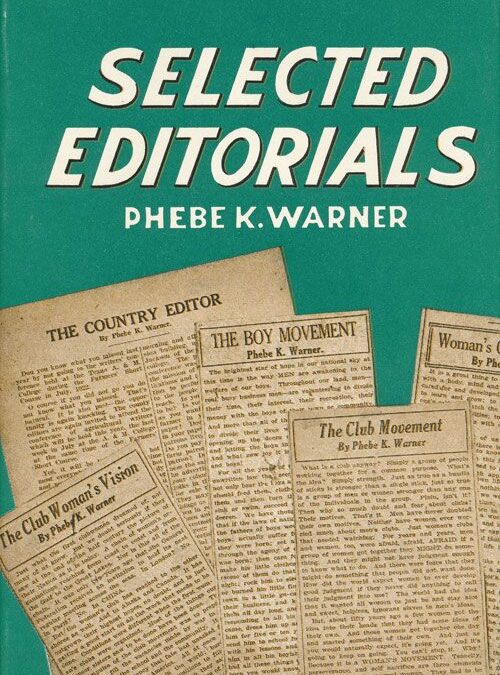Image from Good Books in the Woods
Born: 1866 (in Belle Plain, IL)
Died: 1935 (Texas)
Noted For: Phebe Kerrick Warner was noted as a prominent women’s club leader, lecturer, newspaper columnist, and political candidate.
In the early years of the 20th century, Texas Panhandle doctor’s wife Phebe Warner formed a study club designed to provide intellectual and social stimulation for Panhandle women battling isolation as they raised children, taught school, and managed households amidst the challenges of life on the sparsely-populated Texas plains.
The women’s club concept quickly spread to neighboring communities, and by 1913 the former science teacher was leading an effort to unite the groups into one of the first regionally-federated women’s clubs in the U.S., a group that ultimately became part of the Texas Federation of Women’s Clubs, an organization that helped generations of Texas women take an organized, amplified role in political and civic affairs in the early and mid-20th century.
For the rest of her life, Phebe remained a high-profile leader in the state and national women’s club movements, particularly in the areas of public policy as it affected farmers, education, and conservation. Nicknamed “The Little Brown Wren from Texas” for her diminutive stature, she nevertheless cut an impressive figure whenever she took the stage or wielded a pen for women’s rights, especially when it came to improving conditions for rural women. “What farm women need is a little cash,” she once said in a 1928 speech.
For nearly 20 years, Phebe was a regular contributor to the Amarillo News-Globe, the Fort Worth Star-Telegram and other newspapers. With her friend and noted radio personality Laura Hamner, she co-founded Panhandle Pen Women, an association of women writers in the early 1920s.
Around that same time, Governor William P. Hobby appointed her as the Texas representative to the National Congress of Farm Women, and in 1929 she was a presidential appointee to the National Home Builders Committee. Urged by her friends and supporters, she also ran for Congress during the early years of the Depression, coming in fourth in a slate of 10 men.
In 1923, she was invited to be one of the first members of the Texas State Park Board, where she helped develop the Palo Duro Canyon State Park, the “Grand Canyon of Texas”, located in her beloved Panhandle, where it has long been one of the signature geographic features of that region. Phebe died in 1935 following a bout with pneumonia.
Additional Learning: “Profile of Phebe and William Arthur Warner: White Deer Land Museum”

